
November 27
1874 Birth: Chaim Weizmann, Zionist, first President of Israel:
Russian-British-Israeli chemist who used bacteria for the synthesis of organic chemicals. During WW I, a recent immigrant into Great Britain, he discovered a way to use a bacterium to synthesize acetone during the fermentation of grain. Acetone was important in the manufacture of cordite for explosives. Postwar, he modified the fermentation to produce butyl alcohol, suitable for uses such as lacquers. This was the forerunner of the deliberate use of microorganisms for a wide variety of syntheses. A generation later, penicillin and vitamin B12 were produced in this way. Weizmann was active in politics leading to the establishment of Israel (1948), and became its first president - one of the very few research scientists to become a head of state.
1874 Birth: Charles A. Beard:
Charles Austin Beard was an American historian, author with James Harvey Robinson of The Development of Modern Europe (1907). Born in Knightstown, Indiana, he exemplified modern history writing that encompassed all aspects of culture, and tied economics to politics and intellectual life in works like The Economic Origins of Jeffersonian Democracy. His revisionist study of the conservative interests of the drafters of the United States Constitution (An Economic Interpretation of the Constitution) seemed radical in 1913, since he proposed that the US Constitution was a product of economic determinism, in that it was written to further the interests of the white, land-holding Founding Fathers . . . . Charles Beard was critical of Franklin D. Roosevelt's administration, especially in the struggle over the Supreme Court and in Roosevelt's foreign policy. In the years leading up to World War II, Beard's writings called for the United States to stay out of the war. After the war, Beard's last work (President Roosevelt and the Coming of the War, 1948) argued that President Roosevelt had deceptively and unjustly brought the United States into the war for economic reasons. Beard's views on the war were highly controversial and led to his being widely denounced as an apologist for fascism. As a result, Beard's reputation in the final years of his life was extremely low.
1875 Birth: Franz Xaver Schwarz: one of the "Old Fighters" and a party member from its earliest days:
German politican who served as the Treasurer of the Nazi Party during most of the Party's existence. Between 1934 and 1945, Schwarz also held several titles and positions in the government of Nazi Germany. Franz Xaver Schwarz was only one of four people to have held the rank of SS-Oberstgruppenfuehrer and, of the four, the only one to hold the rank as an honorary title without equivalent Ordnungspolizei or Waffen-SS rank.
1904 Southwest Africa: The German colonial army defeats the Hottentots at Warmbad.
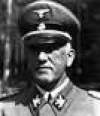
1911 Volkishness: Hermann Pohl sends a circular to some fifty potential anti-Semitic collaborators, stating that the Hammer group in Magdeburg has already established a lodge upon appropriate racial principles with a ritual based on Germanic pagan tradition. Pohl urges his correspondents to join his movement and to form lodges of their own, adding that this project has the full support of Theodor Fritsch.
1914 World War I: Hindenburg celebrates Warsaw campaign:
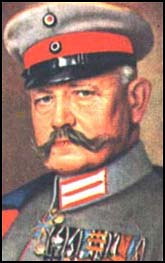
On November 27, 1914, German commander Paul von Hindenburg issues a triumphant proclamation from the battlefields of the Eastern Front, celebrating his army's campaign against Russian forces in the Polish city of Warsaw.
On November 1, Hindenburg had been appointed commander in chief of all German troops on the Eastern Front; his chief of staff was Erich Ludendorff, who had aided him in commanding several earlier victories against Russian forces in East Prussia. The new command, dubbed OberOst, had two objectives: First, they were to mount a counterattack in Poland while their colleague, Erich von Falkenhayn, managed German forces fighting in the Ypres region on the Western Front. Second, they were to balance the faltering Austrian command headed by Conrad von Hotzendorff. Earlier, Conrad had audaciously blamed his army's failure against Russia on a lack of sufficient German support and demanded that 30 new German divisions be sent east, a notion that Falkenhayn steadfastly opposed.
The German campaign against Warsaw, launched in early November 1914, aimed to draw Russian manpower and other resources away from their ferocious assault on the struggling army of Germany's ally, Austria-Hungary. In this it proved successful. The Germans scored several significant victories, most notably at the neighboring city of Lodz. Though the broader German assault ultimately failed, leaving Warsaw still in Russian hands, the Kaiser rewarded Hindenburg by promoting him to field marshal, the highest rank in the German army.
In his statement of November 27, Hindenburg expressed his satisfaction with the results of the campaign and, of course, with his promotion. "I am proud at having reached the highest military rank at the head of such troops. Your fighting spirit and perseverance have in a marvelous manner inflicted the greatest losses on the enemy. Over 60,000 prisoners, 150 guns and about 200 machine guns have fallen into our hands, but the enemy is not yet annihilated. Therefore, forward with God, for King and Fatherland, till the last Russian lies beaten at our feet. Hurrah!" (History.com)
1919 Bulgaria signs a peace treaty with the Allies at Neuilly, France, fixing war reparations, ceding territory to Yugoslavia, Romania, and Greece, and recognizing Yugoslavian independence.
In any case the Bulgarians have put themselves out of court. They sought the arbitrament of the sword, and own themselves thoroughly beaten. We must not listen to the cry of "Pity the poor Bulgarians!" already being raised in some quarters in England. If we start putting all the blame on the kings, and profess to regard the peoples as innocent sheep led astray, we shall next hear it said that the Kaiser is the only criminal in Germany. Our soldiers know better. The Bulgarians have betrayed their Russian liberators, betrayed the common cause of the Balkan peoples, and betrayed their own future. Just as Germany must never again be allowed to plunge the world into woe, so the Bulgarians must never again have the power to set the Balkans aflame. We want a durable Balkan settlement, but not one which will leave the Bulgarians on top. Their national guilt is almost ineffaceable. The atrocities they have committed on the hapless Serbs are as bad as any of the crimes of Germans and Austrians.
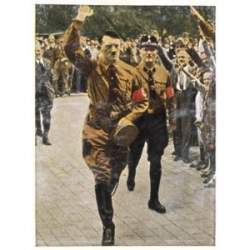
1924 Weimar: Adolf Hitler gives his first speech since his party was banned January 1924, in private at the Burgerbrau Keller.
1925 Weimar: The Reichstag ratifies the Locarno treaties and authorizes the entrance of the Reich into the League of Nations.
1933 Nazi Germany: The German Labor Front establishes Kraft durch Freude (Strength through Joy), an agency to provide German workers with Nazi controlled recreation.

1936 Great Britain: Anthony Eden warns Hitler that Britain will fight to protect Belgium.
1938 USSR: Soviet Jews in Moscow, Leningrad, Odessa and Kiev hold mass meetings protesting Kristallnacht.
1940 Romania: Two months after General Ion Antonescu seized power in Romania forcing King Carol II to abdicate, the pro-Nazi Iron Guard slaughters more than 60 aides of the exiled king, including former Prime Minister Nicolae Jorga, a former minister and acclaimed historian. [For further details, Click here.]
1941 Various: US military authorities issue an ambiguously worded war warning to their overseas commanders, including the Philippines and Pearl Harbor. Cincaf and Cincpac:
This dispatch is to be considered a war warning. Negotiations with Japan looking toward stabilization of conditions in the Pacific have ceased and an aggressive move by Japan is expected within the next few days. The number and equipment of Jap troops and the organization of naval task forces indicates an amphibious expedition against either the Philippines or the Kra Peninsula or possibly Borneo. Execute an appropriate defensive deployment!
War Department to Hawaiian Department Commanding General:
Negotiations with Japanese appear to be terminated to all practical purposes with only the barest possibilities that the Japanese Government might come back and offer to continue. Japanese future action unpredictable but hostile action possible at any moment. If hostilities cannot, repeat cannot, be avoided, United States desires that Japan commit the first overt act. This policy should not, repeat not, be construed as restricting you to a course of action that might jeopardize your defense. Prior to hostile Japanese action, you are directed to undertake such reconnaissance and other measures as you deem necessary but these measures should be carried out so as not, repeat not, to alarm the civilian population or disclose intent. Report measures taken. Should hostilities occur you will carry out the tasks assigned in Rainbow 5 as far as they pertain to Japan. Limit dissemination of this highly secret information to minimum essential officers.
War Department to G2 Hawaiian Department:
Advise only the Commanding Officer and the Chief of Staff that it appears that the conference with the Japanese has ended in an apparent deadlock. Acts of sabotage and espionage probable. Also possible that hostilities may begin.
East Africa: The last Italian forces in Ethiopia surrender at Gondar.
Axis: Hitler meets in succession with high officials from Spain, Hungary, Italy, Croatia, Bulgaria, Finland and Romania.
Voelkishness: Georg Hauserstein, Jr., a longtime ONT member and former head of the presbytery at Hertesburg, founds a schismatic order at Petena called the Vitalis New Templars.
Church and Reich:
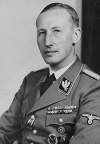
Heydrich reports to the Foreign Ministry that a thirty-point program for a so-called neo-pagan "National Reich Church," circulated as a leaflet in Germany and attributed by Allied propaganda to Rosenberg, was actually written in 1937 by an eccentric from Stettin. Heydrich attributes its reappearance to Catholic elements out to discredit the regime. Note: William Shirer in The Rise and Fall of the Third Reich, accepted this leaflet as a genuine work by Rosenberg.
Holocaust: By this time, more than 15,000 Jews have been deported from throughout Serbia to the concentration camp at Zemun west of Belgrade.
1942 World War II: Various: Stalin to FDR: 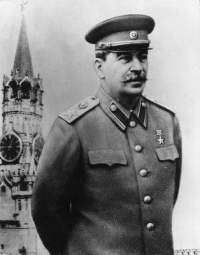
I fully appreciate your desire to explain the military set-up to people in Australia and New Zealand, and your preoccupation with operations in the South-west Pacific. As to the Mediterranean operations, which are making such favorable progress and are important in terms of changing the whole military situation in Europe, I share your view that the time is ripe for appropriate consultations between the general Staffs of the USA, Great Britain and the USSR. Heartfelt regards and good wishes for further success in your offensive.
Stalingrad:
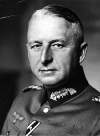
Army Group Don comes into being. Hitler appoints von Manstein to command it, and he is tasked with the relief of Paulus. He has one Luftwaffe, four Panzer and six infantry divisions, together with the remnants of a number of Roumanian formations. These forces are still concentrating, but von Manstein proposes to attack before they all arrive in order to achieve surprise and prevent a Soviet buildup. Rather than take the shortest route to Stalingrad, which runs initially along the River Don from its junction with the Chir, von Manstein choses the axis of the Kotelnikovo-Stalin-grad railway instead. His reasons are reported concentrations of Soviet troops astride the former and the problem of crossing the Don and the Chir. He decides to launch 'Winter Storm,' as it is code-named, on 3 December.
Vichy France: French scuttle their fleet:
On this day in 1942, French Admiral Jean de Laborde sinks the French fleet anchored in Toulon harbor, off the southern coast of France, in order to keep it out of German hands.
In June 1940, after the German invasion of France and the establishment of an unoccupied zone in the southeast, led by Gen. Philippe Petain, Adm. Jean Darlan was committed to keeping the French fleet out of German control. At the same time, as a minister in the government that had signed an armistice with the Germans, one that promised a relative "autonomy" to Vichy France, Darlan was prohibited from sailing that fleet to British or neutral waters. But a German-commandeered fleet in southern France, so close to British-controlled regions in North Africa, could prove disastrous to the Brits, who decided to take matters into their own hands by launching Operation Catapult: the attempt by a British naval force to persuade the French naval commander at Oran to either break the armistice and sail the French fleet out of the Germans' grasp—or to scuttle it. And if the French wouldn't, the Brits would.
And the British tried. In a five-minute missile bombardment, they managed to sink one French cruiser and two old battleships. They also killed 1,250 French sailors. This would be the genesis of much bad blood between France and England throughout the war. General Petain broke off diplomatic relations with Great Britain.
But two years later, with the Germans now in Vichy and the armistice already violated, Admiral Laborde finished the job the British had started. As the Germans launched Operation Lila, the attempt to commandeer the French fleet, Laborde ordered the sinking of 2 battle cruisers, 4 heavy cruisers, 2 light cruisers, 1 aircraft transport, 30 destroyers, and 16 submarines. Three French subs managed to escape the Germans and make it to Algiers, Allied territory. Only one sub fell into German hands. The marine equivalent of a scorched-earth policy had succeeded. (History.com)
1945 Nuremberg Tribunal: On the Sixth Day of the trial, the prosecution continues presenting their case.
1954 Cold War: Alger Hiss released from prison:

After 44 months in prison, former government official Alger Hiss is released and proclaims once again that he is innocent of the charges that led to his incarceration. One of the most famous figures of the Cold War period, Hiss was convicted in 1950 of perjury for lying to a federal grand jury. Specifically, Hiss was judged to have lied about his complicity in passing secret government documents to Whittaker Chambers, who thereupon passed the papers along to agents of the Soviet Union
Upon his release, Hiss immediately declared that he wished to "reassert my complete innocence of the charges that were brought against me by Whittaker Chambers." He claimed that his conviction was the result of the "fear and hysteria of the times," and stated that he was going to "resume my efforts to dispel the deception that has been foisted on the American people." He was confident that such efforts would "vindicate my name."
Some observers remained skeptical of Hiss's protestations. Senator Karl Mundt felt that further investigation of the matter would probably be a waste of time, unless Hiss decided "to come clean and tell the whole story." Chambers issued a brief statement in which he declared that the "saddest single factor about the Hiss case is that nobody can change the facts as they are known . . . . They are there forever. That is the inherent tragedy of this case."
The controversy over the facts in the Hiss case is also here forever. It remains a highly charged issue. His defenders argue that Hiss was a victim of the Red Scare that swept through the U.S. during the 1940s and 1950s. Others are equally adamant in maintaining his guilt, claiming that documents recently released from Soviet archives strongly support the case that Hiss was a spy for the Soviet Union. (History.com)
1958 The USSR unilaterally abrogates Allied wartime agreements on control of Germany.
1997 Tens of thousands of German students take to the streets of Bonn to protest the decline of Germany's higher education system.
Edited by Levi Bookin (Copy editor) Click to join 3rdReichStudies
FAIR USE NOTICE: This site may contain copyrighted material the use of which has not always been specifically authorized by the copyright owner. We are making such material available in our efforts to advance understanding of historical, political, human rights, economic, democracy, scientific, environmental, and social justice issues, etc. We believe this constitutes a 'fair use' of any such copyrighted material as provided for in section 107 of the US Copyright Law. In accordance with Title 17 U.S.C. Section 107, the material on this site is distributed without profit to those who have expressed a prior interest in receiving the included information for research and educational purposes. If you wish to use copyrighted material from this site for purposes of your own that go beyond 'fair use', you must obtain permission from the copyright owner.
Please note that the list-owner and the moderator are not responsible for, and do not necessarily approve of, the random ads placed on our pages by our web server. They are, unfortunately, the price one pays for a 'free' website.
levi.bookin@gmail.com






